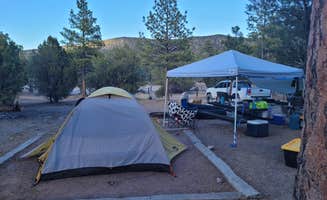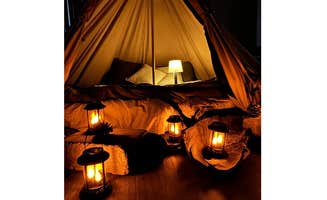Tent camping near Mount Charleston provides an escape from Las Vegas heat with temperatures often 15-30 degrees cooler at higher elevations. Located in the Spring Mountains at elevations between 6,000-8,000 feet, these camping areas feature juniper and pine forests rather than desert terrain. Most sites require visitors to prepare for varying weather conditions, with summer thunderstorms common and nighttime temperatures dropping significantly even during warmer months.
What to do
Hiking nearby trails: Several campgrounds offer access to hiking trails through pine forests and alpine terrain. At Carpenter Canyon, campers can explore a beautiful stream with fish. According to one visitor, "We were the only people out there the first night, one other group of campers the second night. Really very secluded and quiet."
Star gazing sessions: The minimal light pollution creates exceptional night sky viewing opportunities. At Mack's Canyon Dispersed, "Very few insects due to the elevation, and except for the occasion airplane taking off from Vegas, pretty quiet. (Though occasionally there are mysterious booms? Jets from nearby air force base? Dunno.)"
Wildlife spotting: The area hosts diverse wildlife including chipmunks and occasionally larger animals. One camper at Mack's Canyon reported an unusual sighting: "I saw my first mountain lion here! So crazy. Strange to because I've been there so many times and never even see deer really. Lucky night I guess."
What campers like
Temperature relief: The significant temperature difference from Las Vegas makes summer camping comfortable. At Desert Pass Campground, "Just a short drive away, you're instantly transported into cooler mountain air surrounded by beautiful pine and juniper trees. The elevation makes a huge difference in temperature—what feels awful and unbearable in the valley becomes a refreshing and comfortable summer retreat here."
Privacy between sites: Many dispersed camping areas offer well-separated sites. In Mack's Canyon Dispersed Camping, "The sites themselves are quite spacious, which is a big plus if you're setting up multiple tents or bringing along larger vehicles and gear."
Natural water features: Some camping areas have small streams or springs. A Carpenter Canyon visitor noted, "I was FREAKED out on the way in. 12 miles down a very rocky dirt road. Ripped one of the side steps off the truck... But WOW, once you get back there it's amazing. Weather was nice and cool, there's a beautiful little stream with fish in it!"
What you should know
Road conditions: Most dispersed camping areas require high-clearance vehicles. For Eight Mile Dispersed Camping, "I've driven down other washboard roads but even with some speed this road was so tough on my van. We made it and the views and solitude were worth it but it was a loud, bumpy, stressful 2 mile ride."
Limited facilities: Most tent camping near Mount Charleston has no running water. At Desert Pass Campground, "There is NO RUNNING WATER. Be prepared to bring your own if you are staying for any length of time. There is NO CELLULAR SERVICE. The 'toilets' are vault toilets (fancy outhouses) that are not regularly maintained, but were also reasonably clean."
Insect presence: Some camping areas have significant insect activity during certain seasons. One camper at Desert Pass reported, "We got eaten alive!! It's a beautiful area and the nights were beautiful but never again. Its definitely just for a day trip to getaway from the heat for a few hours."
Seasonal considerations: Weather can change rapidly at higher elevations. A Desert Pass camper noted, "In March, temps dropped to below freezing, but we were spared the bugs so at least there was that. There is no running water, cellular service, or firewood, so come prepared."
Tips for camping with families
Site selection strategy: Choose established campgrounds for easier access with children. At Desert Pass Campground, "The site itself is well-maintained, with clean and convenient pit toilets that make camping much more pleasant for families. The grounds are spacious, with plenty of room to spread out and set up camp comfortably."
Water planning: Bring more water than you think necessary, especially with children. According to a Desert Pass visitor, "Be smart, bring water, there is NO water available at this location. During the summer months also be cautious of the bees. We had a MASSIVE presence of bees once we brought the water and cups out, they are just as thirsty as you are up there!"
Weather preparation: Pack for significant temperature drops at night. One camper at The Wild Mustang noted the dramatic sky views but changing conditions: "The sunsets were gorgeous, and at night the stars lit up the sky—some of the clearest you will ever see. There's a really peaceful, raw desert vibe here that made it easy to just slow down, unplug, and relax."
Tips from RVers
Site accessibility assessment: Many of the best tent camping sites near Mount Charleston have limited RV access. A visitor to Carpenter Canyon shared, "Took the travel trailer up Carpenter Canyon on a whim, since we did have a trailer with us we couldn't get all the way to the stream. Ended up pulling off the side of the road, very secluded with a lovely view."
Camping alternatives: Consider parking RVs at more accessible areas and using tents at remote sites. A Desert Pass camper suggested, "Need a capable vehicle to get here. Toilets were clean and there was paper but don't count on it. There are about a half dozen sites mostly geared towards tent camping. Kind of dispersed."
Preparation for temperature swings: RVers should prepare for colder nights than expected. A Carpenter Canyon visitor reported, "It was cold though, thankfully we were prepared in the trailer."




